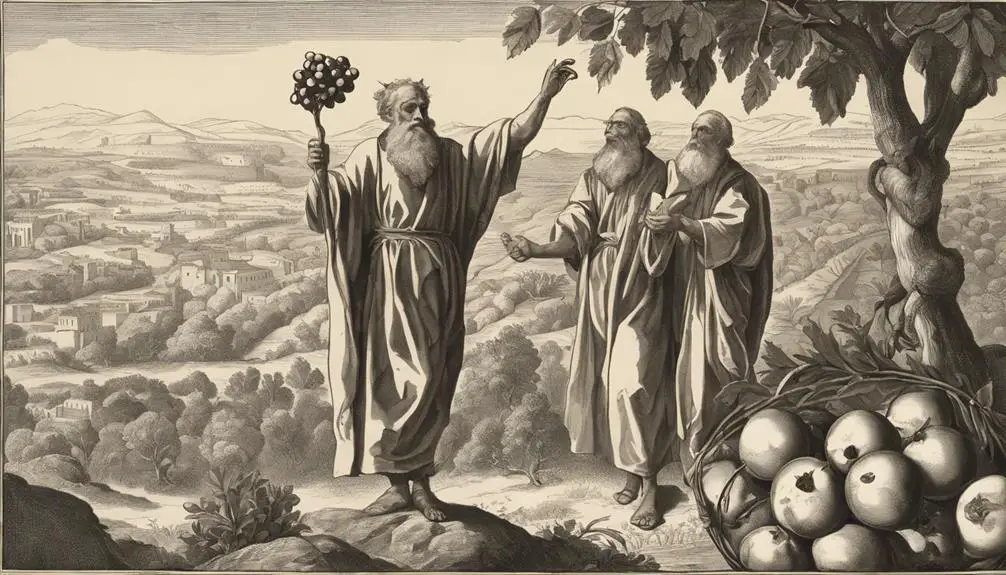A journey into the biblical significance of the number 30 unveils mysteries of faith, betrayal, and divine destiny—discover what lies beneath.

The Number 30 in the Bible
Imagine standing at the crossroads of destiny, where the number 30 holds keys to profound biblical narratives.
You've probably noticed this number weaving through stories of transition and fulfillment, from the initiation of priesthood to the haunting price of betrayal. It marks moments of preparation, power, and prophecy, inviting you to explore its significance beyond mere coincidence.
Why does this number recur in such pivotal events? As you reflect on these instances—Joseph's rise, Moses' exploration, David's kingship, and Judas' infamous act—consider what deeper meanings might lie beneath the surface, waiting to be uncovered in the tapestry of biblical history.
Key Takeaways
- The age 30 symbolizes spiritual maturity and leadership readiness, as seen in biblical priesthood traditions.
- Joseph's rise to power at age 30 exemplifies personal growth and preparedness for significant leadership roles.
- David's journey to kingship by age 30 highlights the importance of trials and divine guidance in shaping effective leaders.
- Judas' betrayal of Jesus for thirty pieces of silver reflects the symbolic economic and prophetic significance of the number 30 in the Bible.
Age of Priesthood Initiation

In the context of biblical tradition, men were called to step into the priesthood at the age of 30, marking a significant threshold in their spiritual and communal roles. This age wasn't arbitrarily chosen; it symbolized a point of spiritual maturity and leadership readiness that was essential for such a sacred responsibility. At 30, individuals were considered to have accumulated enough life experience and wisdom to guide others in their faith and daily life, embodying the qualities necessary for spiritual leadership.
This initiation age underscores a broader biblical principle that values the development of character and discernment over time. It suggests that spiritual authority is something to be entered into with both humility and preparation. The expectation wasn't merely about reaching a certain age but about embodying the maturity and readiness that ideally comes with it.
Thus, the age of 30 serves as a metaphor for preparedness, a benchmark for when one might be ready to take on significant leadership roles within a community, having developed the depth of character and spiritual insight required to do so effectively.
Joseph's Rise to Power
Reflecting on the age of 30 as a milestone of maturity and leadership in biblical tradition, it's noteworthy that Joseph's ascent to power also occurred when he was precisely this age, highlighting not only his readiness but the broader symbolic significance of this period in life. At 30, Joseph's life took a pivotal turn, not merely by chance but through a profound demonstration of his unique skill in dream interpretation. This talent wasn't just a personal gift; it became a vital tool for survival, marking his transition from a prisoner to Pharaoh's most trusted advisor.
The biblical narrative meticulously outlines how Joseph's interpretation of Pharaoh's dreams about seven years of abundance followed by seven years of famine led to a strategic famine preparation plan. This wasn't just about storing surplus grain; it was a visionary approach to governance that showcased Joseph's ability to foresee and mitigate a crisis that could have led to widespread catastrophe. His rise to power at the age of 30, therefore, isn't just a testament to his personal growth and resilience but also symbolizes a period of life ripe for leadership, endowed with the wisdom to navigate and avert crises for the greater good.
Moses' Spies and Exploration

Shifting our focus to Moses' era, we delve into the pivotal mission of the twelve spies sent to explore Canaan, a strategic move that underscored the challenges and decisions faced by leaders in biblical times. This story, rich with symbolism and lessons, highlights the complexities of faith, trust, and divine promises as the Israelites stood on the brink of entering the Promised Land.
The exploration of Canaan by these spies, selected from each of the twelve tribes, isn't just a tale of reconnaissance but a profound narrative that reveals the interplay of faith, fear, and foresight. Consider the following:
- The selection of spies: Each spy was a leader within their tribe, emphasizing the importance of having trusted, influential figures assess the Promised Land. This decision underscores the significance of leadership and representation in critical missions.
- The report on Canaan: The differing perspectives between the majority and Caleb and Joshua highlight the challenges leaders face in guiding people through uncertainty and fear towards faith and conviction.
- The aftermath of the exploration: The Israelites' reaction to the spies' report illustrates the critical impact of trust and belief in divine promises on community morale and direction.
This episode not only examines the physical exploration of a land but also probes the spiritual readiness of a people to embrace their destiny.
David's Kingship Preparation
Before ascending to the throne, David underwent a rigorous period of preparation, marked by trials and divine mentorship, that sculpted him into a leader capable of uniting and guiding the nation of Israel. This period wasn't merely a time of waiting; it was a crucible for David's character and leadership skills, deeply intertwined with the spiritual significance of David's anointing during Saul's reign.
David's anointing by Samuel signified not just the divine choice, but also the beginning of a complex journey toward kingship. This journey was set against the backdrop of Saul's reign—a time characterized by its own challenges and the nation's fluctuating faithfulness to God. David's experiences, from his humble beginnings as a shepherd to his harrowing ordeals evading Saul's jealousy, were instrumental in shaping his reliance on God, his compassion, and his understanding of true leadership.
It's crucial to discern that David's path wasn't just about personal development or overcoming external challenges. His preparation was a divine orchestration, aligning his heart with God's will and equipping him to lead Israel not by might, but by a deep, unwavering faith in the Almighty.
Judas' Betrayal Price

In the narrative of Christ's passion, the price of Judas Iscariot's betrayal—thirty pieces of silver—emerges as a symbol with deep theological and prophetic implications. This act of betrayal, marked by a specific quantity of silver, holds multifaceted meanings that extend far beyond its immediate context.
- Silver Significance: Historically, silver was a medium of economic exchange, valued for its purity and weight. In the biblical context, the choice of silver as the price for Jesus' betrayal highlights its role as a symbol of both betrayal and redemption. It's a reminder of humanity's tendency to value material wealth over spiritual integrity.
- Economic Implications: The amount—thirty pieces of silver—also had significant economic implications at the time. It was the price of a slave, as outlined in Exodus 21:32, which chillingly equates the value of the Messiah with that of a slave. This juxtaposition serves to underscore the gravity of Judas' betrayal and the profound humility of Christ's sacrifice.
- Prophetic Fulfillment: This specific detail fulfills Old Testament prophecy, specifically Zechariah 11:12-13, illustrating the meticulous fulfillment of biblical prophecy. It underscores the sovereignty of God and the predetermined nature of redemptive history.
Frequently Asked Questions
How Is the Number 30 Symbolically Used in Other Religious or Cultural Contexts Outside of the Bible?
In various cultures, the number 30 carries significant symbolism. In Hindu rituals, it often marks important milestones, reflecting a cycle of spiritual purification and renewal.
Meanwhile, in Japanese folklore, 30 is intertwined with tales of longevity and wisdom, representing a phase of life where insight deepens.
This number's role across different traditions highlights a universal respect for the passage of time, embodying themes of maturity, transition, and reflection.
Are There Any Scientific or Astronomical Significances Attached to the Number 30 That Might Have Influenced Its Biblical References?
You'll find the number 30 intriguing, especially when considering its scientific and astronomical significance.
For instance, the lunar cycle, closely approximating 30 days, has been a key timekeeping method since ancient times. This celestial rhythm influenced many cultures, including how they viewed time and age milestones.
Such a connection suggests that the number 30's importance mightn't be solely cultural but deeply rooted in the natural cycles observed by our ancestors.
How Has the Perception or Interpretation of the Number 30's Significance in the Bible Evolved Over Different Historical Periods or Among Different Christian Denominations?
As times change, so do interpretations. You've noticed that perceptions of the number 30's significance have evolved.
Initially, it marked the priestly age, symbolizing maturity and readiness for spiritual responsibilities. However, its association with Judas' betrayal introduced a darker nuance. Different Christian denominations have nuanced these interpretations, reflecting broader theological perspectives.
This evolution showcases the dynamic nature of religious symbolism, continually adapting to new understandings and contexts.
Can the Number 30 Be Found in the Structure or Design of Biblical Temples, Artifacts, or Ancient Manuscripts, Indicating a Deeper, Perhaps Hidden, Significance?
You're exploring whether the number 30 appears in biblical architecture, artifacts, or manuscripts, pointing to a hidden meaning. Your focus on numerical symbolism and architectural measurements is key. By analyzing these elements, you can uncover how ancient builders and scribes might've incorporated the number 30 intentionally.
This approach offers a scholarly insight into understanding the depth of symbolism in religious contexts, revealing how numbers can transcend mere quantities to embody deeper, spiritual significance.
Aside From Its Biblical References, How Has the Number 30 Influenced Modern Literature, Art, or Popular Culture, Especially in Works That Draw Heavily From Biblical Themes or Narratives?
You've seen the number 30 woven into the fabric of modern culture, symbolizing milestones and transitions. It marks 30th anniversaries, celebrated with grandeur in literature and art, highlighting the passage of time.
Musical compositions often commemorate such anniversaries, drawing from biblical themes, embedding a layer of spiritual significance. This symbolism enriches storytelling, offering a bridge from ancient narratives to contemporary tales, inviting a deeper, scholarly exploration of its enduring influence.
Conclusion
In wrapping up, you've seen how the number 30 isn't just a number in the Bible; it's a thread weaving through pivotal moments, from priesthood initiations to kingly preparations. Each instance isn't merely a mark of time but a gateway to destiny, showing that, indeed, timing is everything.
This exploration peels back layers of biblical significance, illustrating that numbers hold deeper meanings, guiding us to understand that in the grand tapestry of life, every thread counts.



Sign up